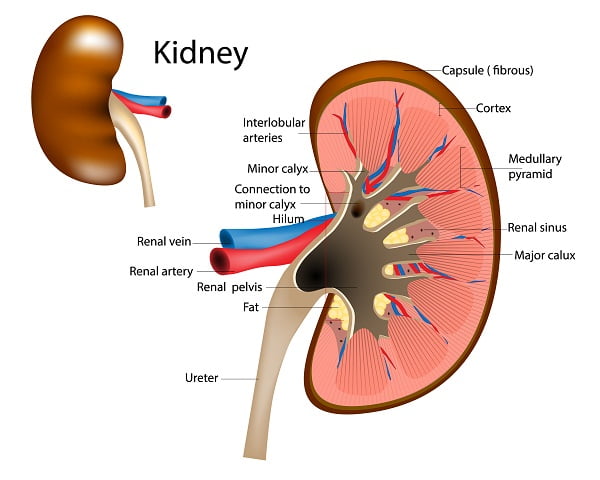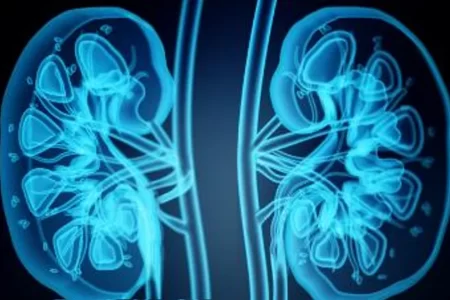What Are Kidneys?
- Updated on: Jan 29, 2025
- 13 min Read
- Published on Apr 19, 2021

The kidneys are a pair of bean-shaped organs on either sides of the body in vertebrates, below the ribs and behind the belly. Each kidney is about 4 to 5 inches long (which is roughly 12 cm), three inches wide (8 cm), and two inches thick (5 cm). Each kidneys weighs about 10 to 12 ounces (280 to 340 grams) [1], about the size of a large fist.
The kidneys’ work is to filter your blood. They remove wastes, keep the body’s fluid balance, and maintain the right levels of electrolytes in the body. The blood in body passes through them many times a day.
Kidneys receive blood from renal arteries. Blood exits into the paired renal veins. Each kidney is attached to the ureter (a tube that carries excreted urine to the bladder).
The two kidneys together filter about 110 to 142 liters of blood to produce about 1 to 2 liters of urine. The urine flows from the kidneys to the bladder through the ureters. Ureters are located on each side of the bladder. The bladder stores the urine.
The muscles of the bladder remain in relaxed state while the bladder fills with urine. When the capacity of the bladder is full, a signal is sent to the brain to tell a person to excrete. When the bladder empties, the urine flows out of the body through the urethra (a tube through which urine is passed out). Urethra is located at the bottom of the bladder. Men have a long urethra. In women, it is shorter.
Why are our kidneys important?
Kidneys are important and vital organs of our body. They keep the composition of the blood stable, which lets the body function. They are important for many reasons such as the following:
- They prevent the wastes and extra fluid to build in the body
- They keep the levels of electrolytes stable, such as potassium, sodium, phosphate
- They produce hormones that help in the regulation of blood pressure, formation of red blood cells, and to keep the bones stay strong
- Kidneys help control your blood pressure by adjusting the volume of blood and releasing renin. Kidneys play a direct role in maintaining healthy blood pressure in your body.
- Active vitamin D produced by the kidneys helps in the absorption of calcium, which is important for bone health.
- Kidneys help in preventing anemia by producing erythropoietin. Kidneys stimulate red blood cell production, which ensures that your body gets enough oxygen.
The kidneys are great chemical factories that perform a variety of functions such as the following:
- remove waste products from the body
- remove drugs from the body
- keep a balance of the body’s fluids
- release hormones that regulate blood pressure
- produce an active form of vitamin D to promote health of the bones
- control the production of red blood cells
Can you live without a kidney?
Yes. You can live with only one kidney as well. If you have one kidney either by birth or later due to donating the kidney or other reasons, your other kidney start functioning above the capacity of one kidney. It can handle more load alone than a single kidney in a body having both kidneys. Healthcare providers sometimes remove one of your kidneys in a radical nephrectomy.
A person may have only one kidney in the following situations:
- A kidney is removed due to cancer or an injury.
- Kidney donation to someone else for a kidney transplant.
- The person is born with only one kidney (called renal agenesis).
- A person is born with two kidneys but only one kidney works (called kidney dysplasia).
Where are the kidneys located in your body?
Your kidneys are located right below your ribcage and behind your belly. In general, one kidney is located on either side of your spine. Your kidneys sit between your intestines and diaphragm. A ureter connects each kidney to your bladder.
Each of your kidneys is connected to your bladder by a thin, muscular tube which is known as ureter. Ureter transports urine from the kidneys to the bladder for storage. The kidneys are protected by fat layers and connective tissue, which provides a cushioning effect and save them from external impact and help keep them securely in place.
The location of the kidneys allows them to efficiently and effectively filter blood, remove waste, regulate fluid balance, and maintain electrolyte levels in your body. This also provides an easy access for medical imaging or diagnostic procedures. Doctors use ultrasounds, CT scans, or MRIs to assess your kidney health.
Functioning of the kidneys: How do kidneys work?
Our kidney is not a single filter. Each kidney is made up of about a million filters. These are called nephrons. Each nephron filters a small amount of blood. The nephron has a filter (called glomerulus) and a tubule.
The glomerulus allows the fluid and waste products to pass through it. However, it prevents the blood cells and large molecules such as proteins from passing out. The filtered fluid passes through the tubule, which sends important minerals back to the bloodstream and removes the waste products. The final product that comes out through this two-step filtration process is urine.
The production of urine involves highly complex steps of excretion and re-absorption. This process is important to maintain a balance of body chemicals, fluids, and electrolytes.
The kidneys perform their life-sustaining job of filtering the blood. Any disease that can affect their functioning can be serious and life-threatening. Chronic kidney disease is one of them that is characterized by kidney abnormality, or markers, such as protein in the urine and a decreased kidney function for three months or longer.
Your kidneys play a major life sustaining role in maintaining homeostasis by regulating fluid levels, electrolyte balance, and various other factors to ensure the body’s internal environment remains stable.
Kidneys perform several essential functions such as:
Waste Excretion
The kidneys filter approximately 200 quarts of blood every 24 hours, and removes waste products and excreting about 2 quarts as urine. Key substances that are eliminated by the kidneys include:
- Urea, produced from protein breakdown
- Uric acid, resulting from nucleic acid breakdown
- Drugs and their metabolites
Nutrient Reabsorption
Your kidneys use tubules to reabsorb essential nutrients from the blood and then transport them to different areas to support health. They also reabsorb other substances to help maintain balance. Reabsorbed nutrients by kidneys are:
- Glucose
- Amino acids
- Bicarbonate
- Water
- Phosphate
- Electrolytes such as chloride, sodium, magnesium, and potassium ions
pH Regulation
The body maintains a narrow pH range of 7.35 to 7.45 for optimal function. The body enters a state of acidemia or alkalemia if the pH deviates outside this range. This can cause damage to proteins and enzymes and result in fatal consequences.
The kidneys help stabilize pH by reabsorbing and producing bicarbonate, which neutralizes acids. They can adjust bicarbonate levels to maintain balance, retaining it when pH is within a safe range and releasing it when acid levels rise.
Osmolality Regulation
Osmolality indicates the balance of electrolytes and water in the body. Dehydration is a common cause of electrolyte imbalances. When blood osmolality increases, the brain signals the pituitary gland to release antidiuretic hormone (ADH). ADH prompts the kidneys to:
- Increase urine concentration
- Enhance water reabsorption
- Open collecting ducts to allow more water back into the body
- Retain urea in the kidney medulla to draw in more water
Blood Pressure Regulation
Your kidneys also help regulate blood pressure over the long term by adjusting extracellular fluid levels. This process is influenced by the release of angiotensin II, which is a vasoconstrictor that narrows blood vessels. This, in turn, increases sodium chloride reabsorption, which expands extracellular fluid volume and raises blood pressure. Excessive alcohol use, smoking, and obesity and other lifestyle factors can harm the kidneys over time by affecting blood pressure.
Secretion of Active Compounds
The kidneys also produce several key compounds:
- Erythropoietin: It stimulates the production of red blood cells.
- Renin: It aids in regulating artery expansion and fluid volumes, including blood plasma, lymph, and interstitial fluid.
- Calcitriol: It is the active form of vitamin D. It improves calcium absorption in the intestines and increases phosphate reabsorption in the kidneys.
Parts of the Kidneys

The structure of your kidney is amazingly wonderful and intricate. This amazing structure gives it an ability to filter blood, regulate body fluids, and maintain overall health of your body. Each kidney is composed of several distinct parts, each with a specific role in its complex functioning. Let’s break down the anatomy of the kidneys:
Renal Cortex
The outermost layer of the kidney is called the renal cortex. It has a reddish-brown appearance due to its rich blood supply. This layer includes glomeruli and the proximal and distal tubules of the nephron. The renal cortex is the area where filtration begins, as blood flows into tiny structures called nephrons to remove waste and excess fluid.
Renal Medulla
Just beneath the cortex is the renal medulla, which is a darker, pyramid-shaped region. Each kidney has several renal pyramids. They consist of tubules and ducts which are responsible for collecting and transporting urine. The medulla has an important role to play in concentrating urine. This helps the body to retain necessary water and electrolytes.
Renal Pelvis
Renal pelvis is a funnel-shaped structure located in the kidney’s central area. It collects urine that is produced by the nephrons and funnels it into your ureters. Ureters are the tubes that transport urine to the bladder. This area also serves as a junction point for the renal blood vessels and nerves that enter and exit the kidney.
Hilum of the Kidney
The hilum is the entry and exit point for important structures such as blood vessels, nerves, and the ureters. Hilium is located on the concave surface of the kidney. The renal artery brings oxygenated blood into the kidney, while the renal vein carries filtered blood back to the body. The hilum also allows urine to pass out of the kidney via the ureter.
Nephrons
Each kidney contains about a million tiny amazing units which are called nephrons. These nephrons are the functional filtering blocks of your kidney. Each nephron has two main parts:
Glomerulus: It is a network of capillaries that filters blood, removing waste and excess substances.
Tubule: It is a long, thin tube where water and essential nutrients are reabsorbed back into the bloodstream, and waste is concentrated into urine.
Renal Columns
Renal columns are extensions of the renal cortex that stretch into the medulla, separating the renal pyramids. They provide structural support and have blood vessels that supply the medulla and cortex.
Calyces (Major and Minor)
The calyces are cup-like structures that are located in the renal pelvis. Urine from the nephrons is first collected in the minor calyces. It then converge into the major calyces before draining into the renal pelvis. The calyces act as the initial storage areas for urine within the kidney.
Ureter
Technically these are not a part of the kidney itself, but the ureters are integral parts of the urinary system. Ureters connect the kidney to your bladder, so that the urine produced in the kidneys is efficiently transported for storage and elimination out of the body.
What Color Are Your Kidneys?
Your kidneys are reddish-brown in color. This red-brown color reflects their rich blood supply and high metabolic activity. This color of the kidneys is due to the dense network of blood vessels and the oxygenated blood they filter continuously.
How Big Is a Kidney?
Each kidney measures approximately 4 to 5 inches in length, which is about the size of your fist. Though they are small in size, yet kidneys play a major role in maintaining overall health through key functions such as filtering blood, regulating electrolytes, and removing waste products from the body.
How Much Do Kidneys Weigh?
The weight of your kidneys can vary based on factors such as height, weight, age, body mass index (BMI), and overall health. In general, average kidneys are relatively lightweight organs, but their function is quite significant. Here’s a breakdown of the size of kidneys:
For Men and People Assigned Male at Birth (AMAB):
- The right kidney typically weighs between 79 grams (about 1/5 lb) and 223 grams (just under 1/2 lb).
- The left kidney is slightly heavier, ranging from 74 grams (a little less than 1/5 lb) to 235 grams (a little more than 1/2 lb).
- In terms of size comparison, each kidney weighs between the equivalent of one to four tennis balls.
For Women and People Assigned Female at Birth (AFAB):
- The right kidney usually weighs between 55 grams (slightly over 1/10 lb) and 274 grams (approximately 3/5 lb).
- The left kidney typically ranges from 67 grams (3/20 lb) to 261 grams (a little under 3/5 lb).
- On average, kidneys weigh the same as one to five tennis balls, with women generally having lighter kidneys than men.
Why Is Kidney Weight and Size Important?
The size and weight of your kidneys provide important information about your health and function. Enlarged or shrunken kidneys may indicate conditions such as kidney disease, infections, or congenital abnormalities. Healthcare professionals use imaging techniques, such as ultrasounds or CT scans, to monitor kidney size and evaluate kidneys for abnormalities.
Kidneys perform life-sustaining functions even with their small size. These functions include processing about 50 gallons of blood each day to remove waste and balance essential electrolytes.
How The Different Parts of Kidneys Work Together
The kidneys are a marvel of coordination. Blood flows into the renal cortex, where filtration begins. Waste is processed in the medulla which is then collected in the renal pelvis. Urine passes through the calyces and into the ureter, before it is ready for excretion. Each part of the kidney plays an essential role in maintaining this coordinated and synced process, which gives your body a balanced and healthy life.
- Losing a kidney means you’ll have serious health issues.
- Most people can live perfectly normal lives even with one kidney. It grows larger to compensate and performs about 75% of the function of two kidneys. In fact, some people are born with only one kidney.
Common Kidney Conditions You Should Know
- Chronic Kidney Disease (CKD): CKD is the gradual loss of kidney function over time. It does not happen suddenly such as in case of an acute injury. Symptoms of the CKD may include such as fatigue, swelling, and changes in urination.
- Kidney Stones: Hard deposits of minerals and salts can deposit in kidneys and ureters to form kidney stones. Kidney stones can cause severe pain and discomfort. Kidney stones require diagnosis and medical or surgical treatment for removal.
- Urinary Tract Infections (UTIs): UTIs often affect the bladder but can spread to the kidneys if remain untreated.
- Acute Kidney Injury (AKI): Sudden loss of kidney function is terms as acute kidney injury. It is often caused by infections or reduced blood flow.
What Causes Kidney Damage or Injury?
Your kidneys are important organs that perform essential life-sustaining functions. However, certain conditions can impair their function and cause an acute or chronic injury. Here’s a breakdown of what causes kidney damage.
Chronic Kidney Disease (CKD)
Chronic kidney disease is a long-term condition that gradually reduces kidney function. It is often caused by diabetes or high blood pressure. CKD progresses over time and is not sudden. If no medical intervention is provided, CKD can lead to kidney failure.
Kidney Cancer
The most common form of kidney cancer is renal cell carcinoma. It develops when abnormal cells grow uncontrollably in the kidneys, which causes severe complications if it is left untreated.
Kidney Failure (Renal Failure)
Kidney failure can be acute (sudden onset) or chronic (progressive over time). End-stage renal disease (ESRD) is the complete loss of kidney function. Dialysis or kidney transplantation is needed to sustain life in case of kidney failure.
Kidney Infection (Pyelonephritis)
A kidney infection due to bacteria travelling up the ureters to the kidneys can be dangerous if the treatment is not provided on time. This condition causes sudden symptoms such as fever, back pain, and nausea. Antibiotics are typically used to treat it.
Kidney Stones
Kidney stones form when minerals in the urine crystallize. Kidney stones can block urine flow, causing severe pain. Small stones may pass naturally, but bigger ones require medical or surgical intervention, such as lithotripsy or surgery or ureteroscopy.
Kidney Cysts
Fluid-filled sacs known as kidney cysts develops in kidneys. Some cysts are harmless but others may grow large enough to impair kidney function and require medical treatment.
Polycystic Kidney Disease (PKD)
PKD is a genetic condition that leads to the formation of multiple cysts on your kidneys. This can cause high blood pressure and increase the risk of kidney failure.
Other Disorders That Can Damage Kidneys
- Acidosis: Excess acid builds up in the kidneys, which can be life-threatening.
- Acute or Interstitial Nephritis: Inflammation of the kidneys, sometimes caused by antibiotics, may lead to kidney failure.
- Azotemia: A dangerous buildup of nitrogen waste in the kidneys.
- Caliectasis: It is the swelling of the kidney’s calyces due to excess fluid. It can potentially lead to kidney failure.
- Diabetes-Related Nephropathy: Uncontrolled blood sugar levels in diabetes can damage the kidney’s blood vessels.
- Glomerular Diseases: These affect the kidney’s filtering units, which can lead to kidney failure.
- Papillary Necrosis: Death of kidney tissue in the medulla and papilla can block kidney function and is called papillary necrosis.
- Proteinuria: Excess protein leaking in the urine can cause kidney damage.
- Uremia: When toxins accumulate in the bloodstream due to poor kidney function, it can be life-threatening and can damage your kidneys.
What Are the First Signs of Kidney Problems?
Kidney problems often remain silent in the early stages. This makes it difficult to detect them early on. As damage progresses, symptoms may appear. Common symptoms of kidney problems include:
- Muscle Cramps: Electrolyte imbalances can lead to cramping.
- Dark or Bloody Urine: Damaged kidney filters allow blood cells to leak into urine.
- Foamy Urine: Indicates excess protein in the urine.
- Itchy, Dry Skin: Caused by imbalanced minerals and nutrients.
- Swelling: Puffy eyes or swollen ankles and feet may result from fluid retention.
- Frequent Urination: Impaired filtering may cause you to urinate more often.
- Fatigue, Sleep Issues, and Loss of Appetite: These result from the buildup of toxins in the blood.
Common Concern Among Patients – Is it Kidney Pain or Back Pain?
Kidney pain and back pain can feel similar and often confuses people.
Back pain typically occurs in the lower back, while kidney pain is felt deeper, higher, and closer to the sides of your middle or upper back, often beneath the ribs on either side of the spine. It may also radiate to the abdomen or groin.
Kidney pain is often caused by swelling or blockages in the kidneys or urinary tract. Common symptoms associated with kidney pain include fever, nausea, vomiting, and discomfort while urinating.
Understanding the difference is essential for proper diagnosis and treatment. Therefore, if you are confused if the pain is due to a kidney problem or a common back pain or muscular pain, it is recommended to get it tested an evaluated by a healthcare provider.
When to Seek Medical Attention
Kidney problems can cause different symptoms in different people. If you experience persistent symptoms such as these – swelling, changes in urine color, or severe back pain, you should immediately consult a healthcare provider. An early diagnosis and treatment of kidney problem can prevent kidney damage from worsening and improve your long-term health outcomes.
You should get your kidney function regularly tested particularly if you have one or more of the following as these can increase the risk of kidney damage:
- A family history of kidney disease – either any one from the parents or siblings.
- Diabetes.
- Heart disease.
- High blood pressure.
- Obesity or being overweight.
- Regular use of certain medications, such as blood pressure medicine or painkillers.
Is Drinking a Lot of Water Good for Your Kidneys?
You should drink the right amount of water for maintaining kidney health. Water helps your kidneys remove toxins and waste through urine and keeps your blood vessels healthy.
Staying hydrated can also help prevent kidney stones and urinary tract infections (UTIs). Kidney stones are less likely to form if you re hydrated well and your kidneys have enough water. Frequent urination from drinking water helps flush out bacteria that can cause UTIs.
A simple way to check if you’re drinking enough water is by looking at your urine color. Light yellow or clear urine is a sign of good hydration. Dark yellow color of the urine indicated you are dehydrated.
How much water should I drink for kidneys health?
Average men should drink about 13 cups (3 liters) of water each day. Average women should drink about 9 cups (about 2 liters) of water each day.
How to Keep Your Kidneys Healthy
You should take care of your kidneys well and it doesn’t have to be complicated. Here are some practical tips for you to consider:
- Stay Hydrated: Drink adequate water to flush toxins, but don’t overdo it. About 8 to 12 glasses of water daily is enough.
- Limit Salt Intake: High sodium levels can strain your kidneys. Consider reducing intake of salt. The Dietary Guidelines for Americans [TR] recommends adults limit sodium intake to less than 2,300 mg per day, which is about 1 teaspoon of table salt. For children under age 14, the recommended limits are even lower.
- Manage Blood Sugar Levels: High blood sugar can damage kidney filters over time.
- Avoid Smoking and Excessive Alcohol: These habits can harm kidney function and overall health.
- Get Regular Screenings: Get yourself checked regularly especially if you have a family history of kidney disease.
Diagnostic Tests to Monitor Kidney Function
Your doctor may recommend any of these tests to monitor the health condition of your kidneys:
- Urine Analysis: Checks for protein, blood, or infections.
- Blood Urea Nitrogen (BUN): It measures waste in your blood.
- Serum Creatinine: These tests indicate how well your kidneys are filtering.
- GFR (Glomerular Filtration Rate): It help in the assessment of your overall kidney function.












